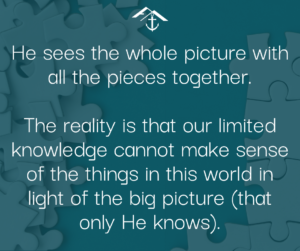What is the Ultimate Hope? (Mic. 7 – Hab. 3)
Despair can be such an overwhelming emotion that it threatens to overtake us. Repeatedly, the Old Testament provides a source of hope when the Israelites’ despondency for their situation threatens to crush them.
The source of hope is centered around a reminder: that God is sovereign and is in control of everything. From wind, to seas, to kings, and nations. God is sovereign over all!
Our hope lies in His omniscience (all knowing), omnipotence (all powerful), and omnipresence (everywhere).

It’s never too late to start!
Download your first two weeks free by signing up below (or buy Book One of the Family Bible Plan)!
[email-download-link namefield=”YES” id=”5″]
Despair can be such an overwhelming emotion that it threatens to overtake us. Repeatedly, the Old Testament provides a source of hope when the Israelites’ despondency for their situation threatens to crush them.
The source of hope is centered around a reminder: that God is sovereign and is in control of everything. From wind, to seas, to kings, and nations. God is sovereign over all!
Our hope lies in His omniscience (all knowing), omnipotence (all powerful), and omnipresence (everywhere).

It’s never too late to start!
Download your first two weeks free by signing up below (or buy Book One of the Family Bible Plan)!
[email-download-link namefield=”YES” id=”5″]
History of Hope
The end of Numbers (chapters 32-36), offers a synopsis wrapping up the book with an overview of the Israelite journey in the wilderness and details about their promised inheritance. Beginning in Deuteronomy, it is plain to see it also is a synopsis, but of the last three books: Exodus, Leviticus, and Numbers. The word Deuteronomy actually means “repetition of the law”.
However, this isn’t just some rote paraphrasing. It is very purposeful in how it is laid out and presented both to the Israelites and for us to read today. Deuteronomy is LITTERED with phrases and reminders of all that God had done, commanded, given to the Israelites–how He cared for them! Continuously, God told the Israelites to remember through Moses.
Anchored Abode
Their future hope resided in their remembering of God’s care for them. When they forgot, didn’t pass it on to the next generation, and/or ignored the past, they lost the hope that had sustained them through thick and thin.
Hop on over to the end of Job to read the conundrum he faced. Here Job had suffered unimaginable earthly trials and felt he deserved a seat in God’s court to defend his life against what had been done to him. When he hears from God, it isn’t God answering his questions; rather, it is God reminding Job of His sovereignty, that it was God who created everything, people, and remains in control today.
Keep going to the major prophets and note what sustained their ministries. They had a first-hand encounter with God and understood His sovereign nature on a level we could only dream about.
When we keep God’s sovereignty forefront in our minds, it keeps us in peace about the future: it is all in His hands.
You keep him in perfect peace whose mind is stayed on You, because he trusts in You.
Bible Gateway
Isaiah 26:3
Ending in Hope…
The book of Micah covers Israel’s coming consequences as well as hopes. The end of Micah, chapter 7, is a similar structure of the misery of Israel from their situation but ending on a note of hope.
God would redeem His remnant and show them mercy.
The book of Nahum comes after the Ninevites repented in Jonah and followed the ways of the world. Nahum brings forward God’s destruction is coming to this nation that opposed Him. There is a sharp contrast to how God provides hope for those who trust in Him and provides destruction for those who defy Him.
The Lord is good, a stronghold in the day of trouble; He knows those who take refuge in Him.
But with an overflowing flood He will make a complete end of the adversaries, and will pursue His enemies into darkness.
Bible Gateway
Nahum 1:7-8
While Jonah was frustrated with God’s mercy over Ninevah, he failed to see that God knows all and knew Ninevah would meet it’s own end by their own undoing.
The Habakkuk in us all…
When we get to Habakkuk, we see a questioning of God that stems from limited understanding.
Habakkuk could not understand why God would use a completely corrupt nation to overtake the Israelites… who were also corrupt, just not as corrupt.
Our understanding is limited by what we see, our viewpoints, and the amount of wisdom God grants us. God’s is matchless and unlimited. Do we know better than Him[?]
Anchored Abode
Putting the pieces together…
[bctt tweet=”The reality is that our limited knowledge cannot make sense of the things in this world in light of the big picture (that only He knows).”]
Do we not question the things that happen around us? Why God, would you allow XYZ to happen? How are THEY not punished when they are doing evil things?
We do not understand the big picture.
Imagine, if you will, that a puzzle was dumped on a table, all 1 BILLION pieces. After years and years, you look at your progress and you have 6 pieces put together.
Now, God knows each and every piece: how they fit together, the colors in each one, at which point in time they will be connected, if any will be lost or thrown away, etc. He sees the whole picture with all the pieces together.
The reality is that our limited knowledge cannot make sense of the things in this world in light of the big picture (that only He knows).
[O]ur limited understanding formulates an arrogant view of ourselves and our position with respect to God.
Anchored Abode

The shift of Habakkuk…
We need to ensure that our questions keep this in mind so we do not arrogantly approach the throne of God with an assumption that we know better or that our solution would fit the occasion.
Now, it is okay to struggle with understanding why as the world has complex issues.
“Habakkuk was perplexed that wickedness, strife, and oppression were rampant in Judah but God seemingly did nothing. When told that the Lord was preparing to do something about it through the ‘ruthless’ Babylonians (1:6), his perplexity only intensified….”
NIV Study Bible
Take note of what happens when God does respond to people with questions. He reminds them of His sovereignty. When that is understood, it completely shifts our focus off our one little puzzle piece to realize that the 1 billion pieces are all simultaneously seen by God and under His control.
The Bible gives us great examples of how to approach God with these puzzling scenarios. But the Bible also gives us the answers that give us hope about our limited understanding.
It is always with God’s sovereignty at the forefront.
Last Week
Jonah 4 – Micah 6
Anchored Truth Tuesdays

~It is appreciated but not required that you follow my social media accounts[DISPLAY_ULTIMATE_SOCIAL_ICONS]
~I do ask that you use the Anchored Truth Tuesdays logo image on your site somewhere or on the post itself; if you click on the picture a new window will open with html instructions
~ Family friendly posts only (I reserve the right to delete any that are deemed inappropriate); with a direct link to a specific blog post
~We have a Pinterest group board, ” Anchored Truth Tuesdays, where all who link up are welcome to also upload their content–you’ll just need to like Anchored Abode first, and then request to join
You are invited to the Inlinkz link party!




So grateful that God sees the whole puzzle!